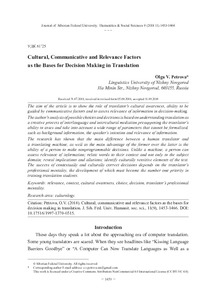Cultural, Communicative and Relevance Factors as the Bases for Decision Making in Translation
Скачать файл:
URI (для ссылок/цитирований):
https://elib.sfu-kras.ru/handle/2311/72275Автор:
Petrova, Olga V.
Петрова, О.В.
Дата:
2018-09Журнал:
Журнал Сибирского федерального университета. Гуманитарные науки. Journal of Siberian Federal University. Humanities & Social Sciences;2018 11 (9)Аннотация:
The aim of the article is to show the role of translator’s cultural awareness, ability to be guided by communicative factors and to assess relevance of information in decision-making.
The author’s analysis of possible choices and decisions is based on understanding translation as a creative process of interlanguage and intercultural mediation presupposing the translator’s ability to asses and take into account a wide range of parameters that cannot be formalized, such as background information, the speaker’s intention and relevance of information.
The research has shown that the main difference between a human translator and a translating machine, as well as the main advantage of the former over the latter is the ability of a person to make nonprogrammable decisions. Unlike a machine, a person can assess relevance of information; relate words to their context and not only to the subject domain; reveal implications and allusions; identify culturally sensitive elements of the text. The success of contextually and culturally correct decisions depends on the translator’s professional mentality, the development of which must become the number one priority in training translation students Цель и задачи статьи: выявить роль осознания переводчиком культурных различий
носителей исходного и переводящего языков, понимание им всех параметров коммуникативной ситуации создания текстов на ИЯ и ПЯ и способности оценить степень
релевантности информации в принятии переводческих решений.
Анализ возможных переводческих решений основан на понимании перевода как творческого процесса межъязыкового и межкультурного посредничества, требующего
от переводчика способности оценивать такие неформализуемые параметры коммуникации, как фоновые знания, интенция говорящего, релевантность информации.
Главное отличие переводчика-человека от переводящей машины и главное преимущество первых перед вторыми заключается в способности человека принимать непрограммируемые решения. В отличие от машины человек может оценивать релевантность информации, соотносить слова с контекстом, а не только с предметной
областью, выявлять импликации и аллюзии, распознавать в тексте места, способные привести к межкультурному диссонансу. Успешность принятия контекстуально
и культурно обусловленных решений зависит от наличия у переводчика профессионального переводческого мышления, развитие которого должно стать основной задачей при подготовке профессиональных переводчиков

